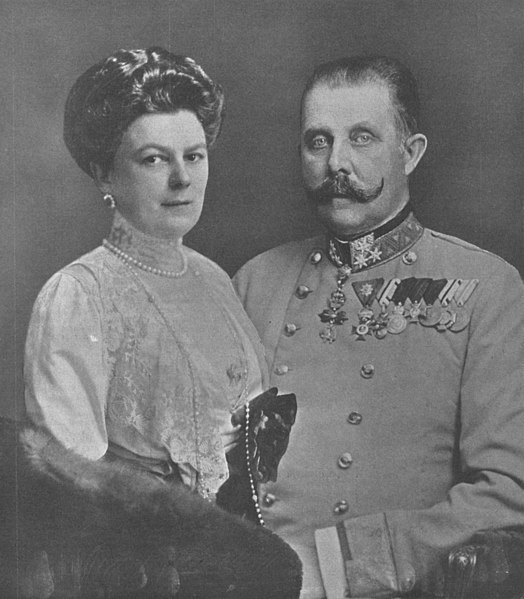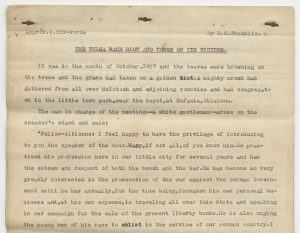Perhaps people are more familiar with Franz Ferdinand due to his assassination, which sparked World War I, yet, his life was full of controversial events.1 But actually, his marriage was an eventful occurrence that ignited controversy around the world, especially within the Austro-Hungarian royal family itself. The controversies surrounding Franz Ferdinand’s marriage raises a number of questions. Is it moral to disobey one’s parents’ wishes to marry someone? Who has the most prominent part of the decision when it comes to marriage? Can one marry whomever one desires? These questions were in Franz Ferdinand’s mind when he sought to marry Sophie Chotek—the woman he loved. Could he marry her, or would he have to submit to his family’s claims that she was not worthy of him?2 Even with the world against them, Franz Ferdinand completed his love story with Sophie Chotek through ambition, defiance, and love, which not only joined them, but also posed a menacing threat for them.

Born in 1863 at the Herberstein Palace in Graz, Archduke Franz Ferdinand was introduced into a world of nobility and luxury, as he was part of the royal family ruling the Austro-Hungarian Empire. Sophie, Duchess of Hohenberg, was born in 1868, into a family of aristocrats, who were quite distant from the social status held by the Archduke.3 The Archduke and Sophie married in 1900; people, especially the Archduke’s family, perceived Franz Ferdinand’s and Sophie Chotek’s marriage as one that mixed gold and lead. Even though the bride’s family was securely aristocratic, that did not compare to the titles that the groom and his family held. Consequently, one of the most famous morganatic marriages in history took place, that is, a marriage between two persons of uneven social status. In the case of Francis and Sophie, the offspring of the marriage, and Sophie herself, would be deprived of the rights and properties that would accrue to members of the royal family.4 Being an Archduke, Franz Ferdinand belonged to the royal family, holding all of the royal rights and privileges of that royal status; Sophie, the Duchess of Hohenberg, was merely blue blooded–aristocratic, with aristocratic rights and privileges–but not royal ones. And clearly to the royal family, Franz Ferdinand and Sophie Chotek were of unequal rankings. Therefore, according to the law, neither their children, nor Sophie, would ever be able to aspire to have a royal position in the Austro-Hungarian Empire.
This was just one of the consequences that Franz Ferdinand and his future family would have to endure, due to his morganatic marriage. But theirs was not the only case like this in this period of time. Other cases of famous morganatic marriages with major social impacts were: King Leopold and Caroline Lacroix, where the unconventional King of Belgium married a French singer he saw on the Parisian streets; the Archduke Charles and Elsa Czuber, another “disgraceful” marriage among the Habsburgs between a defiant Archduke (antagonized by Emperor Franz Joseph–similar to Franz Ferdinand’s case) and a mundane, second-rate actress; and the Grand Duke Paul and Olga Karnovitch, where the Russian Duke of the House of Romanoff was left a widower, so he wooed a married woman to be with him, until she divorced and married the Duke. Nonetheless, Archduke Franz Ferdinand and Sophie, Duchess of Hohenberg, carried out one of the most preeminent morganatic marriages, given the upheaval caused by Franz Ferdinand’s ambitious quest to marry Sophie.5

It is important to note that before Archduke Franz Ferdinand began his love odyssey, a series of convenient events took place. Indeed, Franz Ferdinand was son of Archduke Karl Ludwig, and nephew of Emperor Franz Joseph I; the probability of him becoming the next Emperor of Austria had been unlikely; but a plethora of improbable vicissitudes had happened that made the improbable a possibility. First, in 1889, the heir apparent (next in line for the throne), Crown Prince Rudolf, committed suicide for unknown reasons by pulling the trigger towards his mistress, and then proceeding to shoot himself. This unexpected, tragic, and unorthodox event left Franz Ferdinand’s father, Archduke Karl Ludwig as the heir apparent to the Austro-Hungarian throne. Finally, with Franz Ferdinand being heir presumptive (a potential heir to the throne), it literally took only a few days for Archduke Karl Ludwig to renounce his position, leaving Franz Ferdinand as the heir apparent under Emperor Franz Joseph I. As it would be, Franz Ferdinand, in a matter of days, ascended the royal ladder and became even more powerful than he was before, unknowingly setting a more difficult obstacle for his future marriage with his non-royal spouse.6
It was in Vienna, in the year 1894, that these two lovers met for the first time, at a masquerade ball at the Larish Palace; incidentally, this was on the day Franz Ferdinand was bound to ask Archduchess Gabrielle to marry him, the woman with whom their superiors had arranged for him to marry.7 However, the Archduchess was vexed by all the royal expectations of her future, regarding marriage and behavior, for example, and she wished to lead a normal life without following standards imposed on her. So, coincidentally, just as the Archduke was about to ask for her hand, Countess Sophie Chotek, waiting in line behind Archduchess Isabella, stepped into the room; Gabrielle’s salvation had arrived. In attempt to escape the royal marriage, Gabrielle introduced Sophie to the Archduke, and they instantly fell in love. Subsequently, Franz Ferdinand and Sophie met again, and this time, the Archduke asked Sophie to marry him, to which she replied saying that she was worried, since she was cognizant that she was not as royal as her imminent spouse. When Archduchess Isabella learned about this, she became infuriated and tried to expel Sophie from the emperor’s castle. Regardless, Franz Ferdinand obstinately rebelled against the family’s opinion and insisted in marrying Sophie, even if that meant taking a stand against his uncle, Emperor Franz Joseph I. At first, Franz Joseph I was in utter denial at the idea of the marriage, and he disliked Sophie for this, but in the end, he reluctantly allowed the marriage to take place, with the condition of it being morganatic—in its full connotation. Evidently, Franz Ferdinand fell in love with a woman disapproved by his family, and out of the many antagonists he gained by this, his uncle was the one with the most discontent towards the Archduke.8
Many years passed, and Sophie continued to be rejected by the royal family. In fact, Emperor Franz Joseph I abhorred the idea of his nephew’s marriage with a woman that, to his eyes, “shamed the dignity of the House of Habsburg.”9 In his defense, Franz Ferdinand countered the idea of marrying royalty with fellow royals by saying, “So it comes about that with us man and wife are always related to each other twenty times over. The result is that half of the children are idiots!”10 Hesitantly, the Emperor allowed the marriage. Soon after, on July 1, 1900, Archduke Franz Ferdinand and Sophie, Duchess of Hohenberg, rightfully married at Reichstadt. However, the Emperor decided to shame the heir presumptive’s marriage by not attending the wedding, and he treated his nephew’s family as nonexistent in the near future. Other members of the Habsburg family continued their reprimands against Sophie, angering the Archduke. For example, women of the court constantly said: “Don’t let her think she’s one of us!” And Sophie (even though she was as educated, beautiful and courteous) was often forced to walk on the left side of her husband to remind people of her unequal status. Regularly, Franz Ferdinand would confront people who insulted Sophie, regardless of their rankings, yet, nothing could make the romance between the now married couple recede.11
In 1913, after thirteen years of a happy marriage that produced one daughter and three sons, critics against Sophie continued to prevail, and Franz Ferdinand always decided to ignore such insults; he ignored all norms regarding Sophie and he always tried to sneak Sophie into reunions, high class parties, and balls that she was mostly left out of. Hence, one day, Franz Ferdinand was invited to meet with one of Franz Joseph’s confidants, and when this officer of high ranking learned that Franz Ferdinand intended to bring Sophie with him, he informed Franz Joseph, who had appointed Franz Ferdinand as inspector general of the armies. In an ill-fated invitation, Franz Ferdinand was sent to inspect army maneuvers at Sarajevo.12 This was set to happen in June of 1914, and Sophie was scared of this trip to the Bosnian capital, because Franz Ferdinand, as he began to prepare for his role as Emperor of the Austro-Hungarian Empire, had sympathized with the Slavs, gaining enemies from both the Pan-Serbian and Pan-German groups, including the hatred of Kaiser Wilhelm II of Germany.13

When the day came to leave Franz Ferdinand’s and Sophie’s magnificent home in Vienna, Franz Ferdinand was accompanied by his wife, since she feared her husband’s destiny once he set foot on a land where he was not popular among the people. They departed for Sarajevo, and on June 28, 1914, they started conducting the inspection tour. Unfortunately, while riding their car in the streets of Sarajevo, a nineteen-year-old Serbian nationalist, Gavrilo Princip, shot and killed both Franz Ferdinand and Sophie. This infamous event in history then triggered a series of events that escalated a month later into one of the most horrible wars in history, World War I.14
Definitely, the romance between Sophie Chotek and Franz Ferdinand had no boundaries, and Franz Ferdinand’s decision to marry someone outside royalty brought him condemnation by his own uncle, Emperor Franz Joseph I, and many others of that rank. This romance was incessant; the insults against his wife, the threats, the unstoppable mistreatment Sophie received, and certainly, not even death, could tear Franz Ferdinand and Sophie Chotek apart.
- Harlan Ullman, A Handful of Bullets: How the Murder of Archduke Franz Ferdinand Still Menaces the Peace (Annapolis, Maryland: Naval Institute Press, 2014), 1-6. ↵
- Richard Cavendish, “Birth of the Archduke Franz Ferdinand,” History Today 63, no. 12 (2013): 2. ↵
- Funk & Wagnalls New World Encyclopedia, 2018, s.v. “Francis Ferdinand.” ↵
- The Companion to British History, 2001, s.v. “Morganatic Marriage,” by Charles Arnold-Baker. ↵
- Charles Kingston, Famous Morganatic Marriages (England: S. Paul and Co, 1919), 5. ↵
- Richard Cavendish, “Birth of the Archduke Franz Ferdinand,” History Today 63, no. 12 (2013): 1-2. ↵
- Greg King and Sue Woolmans, The assassination of the archduke : Sarajevo 1914 and the romance that changed the world (New York: St. Martin’s Press, 2013), 43. ↵
- Charles Kingston, Famous Morganatic Marriages (England: S. Paul and co, 1919), 255-261, 268-270. ↵
- Greg King and Sue Woolmans, The assassination of the archduke : Sarajevo 1914 and the romance that changed the world (New York: St. Martin’s Press, 2013), 59. ↵
- Greg King and Sue Woolmans, The assassination of the archduke : Sarajevo 1914 and the romance that changed the world (New York: St. Martin’s Press, 2013), 35. ↵
- Greg King and Sue Woolmans, The assassination of the archduke: Sarajevo 1914 and the romance that changed the world (New York: St. Martin’s Press, 2013), 70-74. ↵
- Greg King and Sue Woolmans, The assassination of the archduke : Sarajevo 1914 and the romance that changed the world (New York: St. Martin’s Press, 2013), 163-164. ↵
- The Columbia Encyclopedia, 2018, s.v. “Francis Ferdinand,” by Paul Lagasse. ↵
- The Columbia Encyclopedia, 2018, s.v. “Francis Ferdinand,” by Paul Lagasse. ↵




48 comments
Karina Cardona Ruiz
I liked your introduction and your article as a whole. I didn’t know anything about Franz Ferdinand’s personal life or love life so it was an interesting read. I’m glad that now we are much more accepting of who people choose to love and wish to marry but there is still progress to be made. It seems as though Ferdinand and his wife had to endure a lot of criticism and mistreatment throughout their marriage which I can’t imagine is an easy thing. I liked the analogy you incorporated about how “people,especially the Archduke’s family, perceived Franz Ferdinand’s and Sophie Chotek’s marriage as one that mixed gold and lead.” In the end, all that really mattered was how they felt about each other and the family they created so at least they didn’t let all the criticism get to them.
Tessa Bodukoglu
this was such an interesting and informative article to read. I have heard of the name Ferdinand but I haven’t learned much. I have never understood why in order for a royal to get married they have to marry someone of the same social class. people should be able to marry whoever they want without other people objecting against it.
William Rittenhouse
I would of done the same thing if I was in his shoes. It shows that it isn’t all the family’s call on who you get to marry. The important thing is that you love each other and aren’t just faking it because of being of a noble status. I think a lot of nobles married each other because they were nobles and would continue the heritage, not because they actually loved each other. Francis changed the game which ended up tragic in the end.
Daniela Martinez
This article is well written and highly informative. It was easy to follow the love story between Franz and Sophie. It was very admirable that Franz went to such lengths to marry the woman he truly loved, instead of proceeding to marry a woman whom he knew he would not have a happy life with. Although being married to Sophie, restricted Franz from many of the luxuries he was entitled too, it is very romantic of him that he didn’t want any of that if Sophie couldn’t be a part of it. What I found to be the most interesting is that Sophie had a bad feeling about Franz going on the trip so much that she decided to accompany him to ensure his safety.
Stephanie Silvola
I believe that love should be for everyone and anyone. For Franz to go so far to marry Sophie is romantic. The couple both knew that getting married could have problems, but love prevailed in this relationship. It is sad that they had to be assassinated just because their marriage wasn’t approved, but at least this teaches that no matter who you fall in love with you can get through any hardships; maybe not ending in a tragic death though.
Julia Deais
This is a very well written article as well as very interesting! I was amazed to see how Franz stood up for what he loved. He would marry Sophie no matter what other people thought. He did not care what they thought. They had children and a lot of love within their family all the way up to the point that Franz and Sophie were assassinated.
Jabnel Ibarra
I’d always known Franz Ferdinand as being one of the key figures behind the start of the first World War, but I never knew anything about his personal life. It was very interesting learning about what exactly made him such an important figure in the war and why he was immortalized in history for nothing more than his assassination.
Emily Jensen
I actually was unfamiliar with Franz Ferdinand’s story prior to reading this article. I had no idea about his relationship with Sophie Chotek, what an underrated love story! I really enjoyed reading about their history, both before and after they met, and what they both had to go through during their lives. The author managed to be very entertaining while staying informative, overall a great read!
Didier Cadena
This was a very interesting article. I was unaware of this part of Ferdinands life, so it was nice to read a little bit about him. It would seemed that Franz worked tirelessly to be able to marry the woman that he loved. The article does a great job of putting all of the information together and still make it interesting to read.
Sabrina Hsu
It was really interesting reading this article and learning about Franz and Sophia’s love and all the struggles they went through because of it. However, they didn’t let any of those struggles stop them from being together. I was surprised that they met because they were introduced by the woman that Franz was originally supposed to marry, but the story of their meeting really makes it seem like they were meant to be, and I think that’s so amazing.